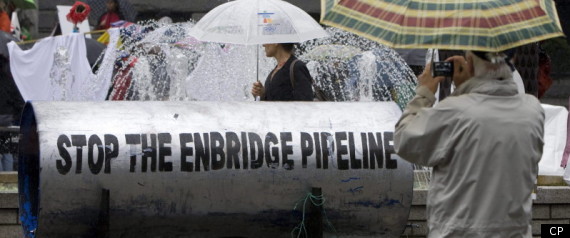UPDATE: Citing the influence of "radical groups" seeking to stop oil pipeline construction, the Harper government is planning to shorten environmental review periods for major energy infrastructure projects such as oil pipelines, the Globe and Mail reported Monday. In a letter to the newspaper, Natural Resources Minister Joe Oliver cites “jet-setting celebrities” funded by foreign special interest groups who “threaten to hijack our regulatory system to achieve their radical ideological ends.”VICTORIA - It's being called a nation-builder, nation-divider and non-starter.
An overhauled environmental review system would have as its objective "that these reviews would no longer go on for many, many years," Oliver wrote. "They would have a definitive timeline that would provide certainty to the participants who are sponsoring the project.”
Depending on who's talking, the proposed Northern Gateway oil pipeline project has the potential to make Canada rich, while risking an environmental disaster on the scale of the Exxon Valdez oil spill.
Federal regulatory hearings for Enbridge Inc.'s controversial and anticipated $5.5 billion twin pipeline proposal to carry Alberta crude oil to the West Coast for export to Asia start Tuesday in northwest B.C. in Kitimat, the proposed oil tanker port.
More than 4,300 individuals and groups have registered to speak at the hearings conducted by two federal environmental bodies over the next 18 months or more across British Columbia and Alberta.
Northern Gateway is being billed as the largest private infrastructure project in B.C. history.
But it's also a major target of Canadian and international environmental groups that are gearing up for a public relations battle that pits environmental protection against economic development.
The recent U.S. government decision to delay by at least one year the $7-billion proposed Keystone XL pipeline expansion project, connecting Alberta oil to Texas, has put the Enbridge proposal in the sights of international environmental groups.
First Nations are also joining the process, with at least 60 B.C. aboriginal groups vowing to fight the project at every step, but others signing deals with Enbridge, or seriously considering company offers of a 10 per cent stake in the enterprise.
"Single-handedly, (Northern Gateway) would add about $270 billion to the Canadian gross domestic product," said Paul Stanway, Enbridge's communications spokesman.
"You can buy a lot of hospitals and schools with that kind of money."
He said the project will create about 1,150 full-time jobs in Alberta and B.C. He said suggestions by environmental groups that earlier Enbridge estimates of as few as 45 full-time jobs were "nonsense."
But Dogwood Initiative spokesman Eric Swanson said he finds it offensive that the federal Conservative government has called the Northern Gateway proposal "an exercise in nation building," essentially linking Canada's economic prosperity to the oil industry.
The Victoria-based Dogwood Initiative, which opposes oil tankers on the West Coast, will oppose Northern Gateway at the hearings, he said. The organization is responsible for helping sign up 1,600 people to speak at the hearings.
"I take issue with the claim that Northern Gateway is necessarily in the national interest, because from my perspective on Vancouver Island, that is obviously not the case," said Swanson.
"This isn't going to be a nation-building project, this will be a nation-dividing project."
He said the project asks Canadians to risk environmental catastrophe on the West Coast for the promise of oil dollars.
"I guess that's the fundamental question," Swanson said.
In Kitimat, located about 1,500 kilometres northwest of Vancouver, aboriginals in the nearby Kitimaat Village, will oppose Northern Gateway even though the Haisla aboriginals back a B.C. government plan to build a natural gas pipeline and liquefied natural gas export terminal on their homeland.
"We don't agree with the (Enbridge) project," said Kitimaat chief councillor Ellis Ross.
"That's set in stone because we haven't seen any technology out there that can guarantee that, No.1, there won't be a spill, and, No. 2, if there is a spill, that it can be (cleaned) up."
Ross said Ottawa's earlier comments calling Northern Gateway a national interest initiative suggests the federal government wants the project to go ahead, but that won't stop Kitimaat's aboriginals from opposing the development.
"They (Enbridge) think they have the support of the federal government," said Ross. "I guess they're banking on it. But I haven't seen anything that says in the Constitution that we have to ship oil to Asia for a few extra dollars."
Aboriginals across British Columbia have vowed to fight the proposal, saying the pipeline infringes on their traditional territories and the threat of an oil spill on land or along the coast threatens their lifestyle.
Aboriginals at Hartley Bay, near Kitimat, oppose Northern Gateway, saying they are still feeling the effects of the March 2006 sinking of the B.C. ferry Queen of the North, which they say continues to leak diesel from the ocean bottom, tainting their seafood.
Late last year, when Elmer Derrick, a hereditary chief of the Gitxsan First Nation announced he had signed a deal with Enbridge on behalf of his people, a backlash from within his community erupted.
Protests continue outside of Derrick's Gitxsan treaty office in Hazelton, B.C.
But Stanway said Enbridge still has a deal with the Gitxsan and he added that private deals are in the works with about 40 per cent of aboriginal groups where the pipeline touches their territories.
Stanway did not name any of the First Nations who are making deals with Enbridge.
"It's up to them to identify themselves, not us," he said.
Stanway said even though Enbridge is not part of the first hearings, he's looking forward to the start of the process because it gives the company the opportunity to address the project, especially the environmental concerns that an oil spill is inevitable.
"It's not inevitable at all," said Stanway.
"We've gone to great lengths to show that tankers can come in and out of the Douglas Channel to Kitimat in perfect safety."
Original Article
Source: Huff

No comments:
Post a Comment